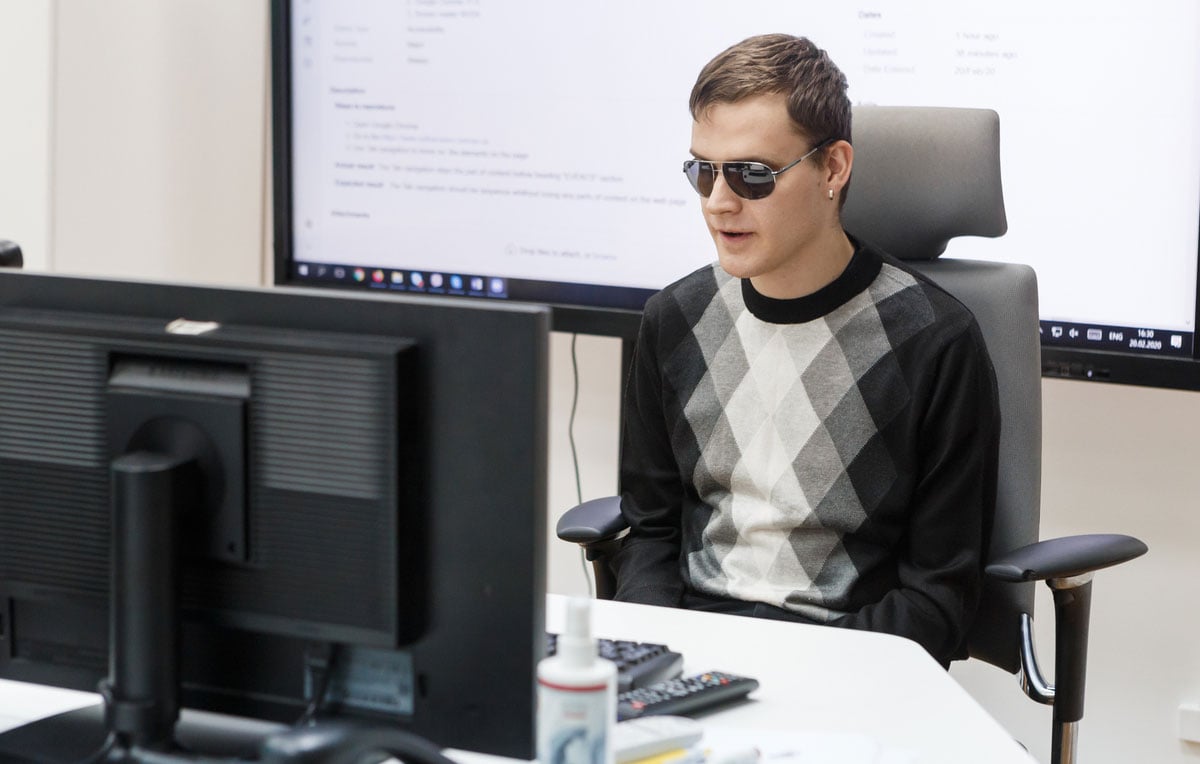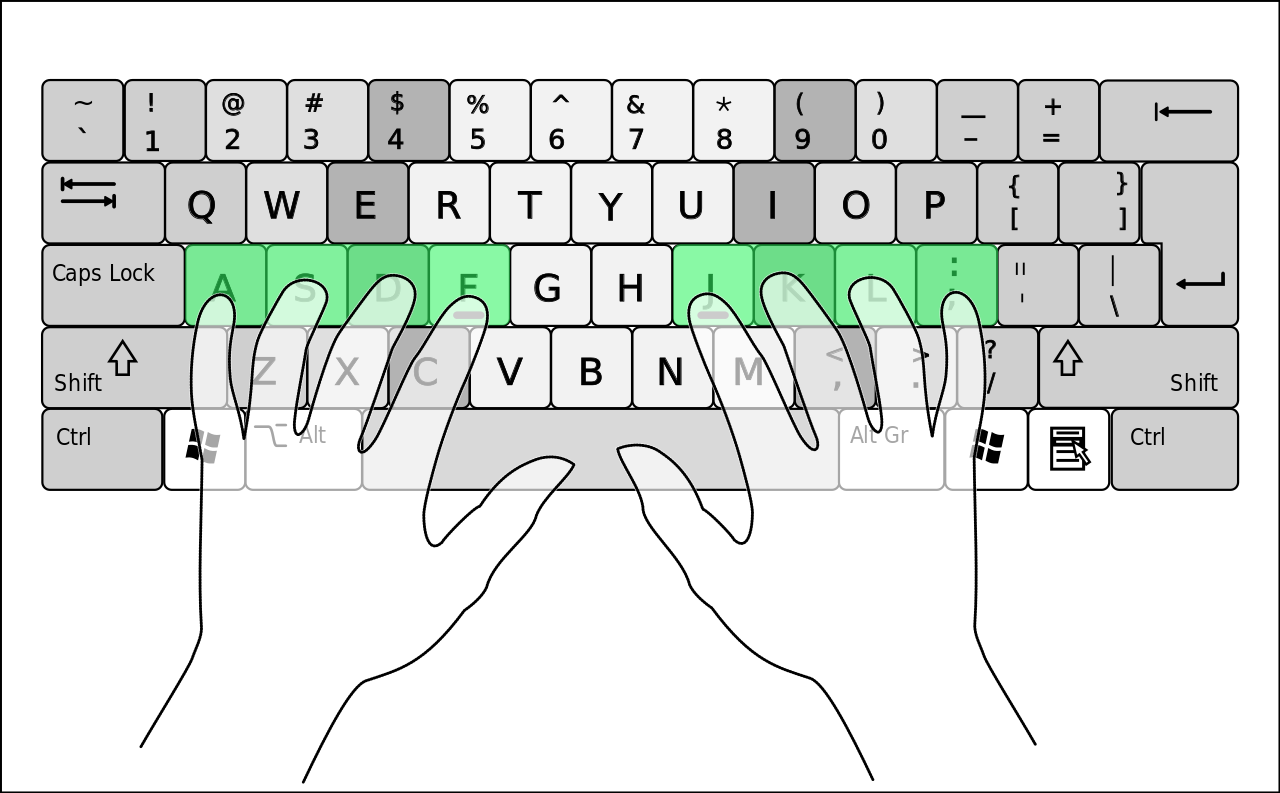Jobs for the blind: how free courses in Lviv help people with disabilities find employment
"With the skills I have now I could work at the job I had before I lost my sight," Mykola Lahotskyi

It's sometimes challenging for people with visual impairments to find work. In Ukraine, it's one of several ways: either "turning the lids in UTOS," the Ukrainian Association of the Blind, which also specializes in the production of sockets, switches, lamps, fuses, etc., or working as a masseur, this profession is often chosen by the blind. When asked why they explain that "It so happened."
However, this situation is unacceptable, as pre-determined career guidance for people with visual impairments is leveling any talk of equal opportunities for all. This situation is gradually, slowly leveling off since now the caring Ukrainians, who themselves were once at the center of this problem, have taken it upon themselves to solve it.
A man who inspired and passed away
The public organization "IUS" was founded in 2005 by Andrii Maksymovych and Mykola Pekh. Mykola was blind, but the organization's activities weren't focused on inclusion: it organized Ukrainian language courses for foreigners, trained young people to participate in international projects, and established partnerships with foreign NGOs. The biggest project that existed before the courses had been charity marathons and bike rides, the funds of which were used to buy boxes for newborns at Lviv Hospital, which lacked medical care.
Later, blind people began to take part in bicycle races, on double bicycles paired with a sighted person. It was then that Mykola managed to apply for the grant he won but didn't live to see the competition results; they came two weeks after his death. However, Mr. Pekh's cause was continued.
"People had to mobilize and continue the work without a thought leader," said Anna Lukasevych, the current head of the NGO.
The last of the bike rides took place in 2019. Participants covered the distance from Ivano-Frankivsk to Berlin on bicycles.
"At first I was going to become a masseur because that's what happened. Many of those with visual impairments go into this profession"
Mykola from Lviv started to have visual impairments as an adult: before that, he changed several jobs, worked in various positions in banks and insurance companies, but after his sight was lost, he could no longer continue to work in his usual field.
"At first I was going to become a masseur because that's what happened. Many of those with visual impairments go into this profession, but then my mother gave me the idea: working at a computer, and I had to learn to work from scratch. I needed to study the keyboard and learn computer literacy again because working with Word, Excel has a different specificity. Just so you understand, blind people don't use a mouse at all, only a keyboard," Mykola Lahotskyi recalls.
In 2016, when the organization began to actively develop its activities in the inclusion field, that's when the courses for the blind began, Mykola joined the project, and since then has been actively involved in the project's development.
Adopt and multiply. Where did the idea for the courses come from?
The IUS educational activities were changed to distance learning courses; Marta Dropa, who was working on the project at the time, oversaw the idea in the United States and developed it in Ukraine. Together with Roman Borenko, Andrii Butenko, and Mykola Lahotskyi, Marta organized courses for blind people: first, students learned to work with NVDA, a screen access program with speech synthesis that allows people with visual impairments to work with a computer, and then they gave students the skills to work with Word, Excel, later found teachers who taught the Python programming language to train full-fledged programmers, English, taught students to use social media and work in the Reaper music editor. At the same time, almost every course teacher was blind. Mykola recruited the first students to the English language group on his own, among his acquaintances, and later blind people from other cities began to enroll in online courses:
"We have very close communication, and soon after the start of the courses we were no longer looking for students, but students are looking for us, following the recommendation of their acquaintances," says Mykola.
As part of the IUS IT Network socio-cultural project, IUS is currently developing a new course to prepare students for work as testers, drawing on the experience of the well-known IT company Softserve, which already employs people with visual impairments. By the way, the average salary in the Ukrainian market for such a vacancy, according to Work.ua is 21 thousand hryvnias, and in Kyiv, it's about 30 thousand.
From the 10-finger method to employment: how many people have changed their lives for the better?
Now students are taught by a dozen teachers; 70 students with disabilities have passed through the IUS IT Network, many of whom have taken several courses. First, the blind need to be taught the 10-finger method they use to work on the computer. Mykola Lahotskyi shares with us that it can be mastered remotely, although previously it was taught only in rehabilitation centers:
"Each finger is responsible for a certain key. I studied this method in person, went to a rehabilitation center. But then I decided to try to teach it online, and, you know, I succeeded. Right now, I have two women and a man studying with me. Classes are only individual because it is easier to explain where the key is located," the teacher shares his experience. After a person masters the keyboard, he/she can take part in courses. Without knowledge of the 10-finger method, learning, according to Mykola, will be difficult, "And with it, it takes place without problems," he says. All lectures are held in the Team Talk program, each group has its own rooms, and the program itself is adapted for comfortable use by visually impaired people.
Training is not in vain: "A very important point in training is to employ a person so that the courses don't just take place but lead to a person actually realizing the ambition. In Ukraine, it's difficult to find a job even for a person without a disability, so we emphasize that we help people find a job after our courses," says Anna Lukasevych. According to her, more than half of the graduates found it, in call centers, as sales managers, and even in the IT industry.
Successful examples abound: course graduate Oksana Voitko from Vinnytsia has opened her own knitwear store, Oleksandr Hryshchenko from Cherkasy works as a Python programmer, and lawyer Maria Hohilchyn from Ivano-Frankivsk has improved her spreadsheet skills.
Funding difficulties and solutions: connecting with other organizations
IUS IT Network courses are completely free for students. Support of the platform and payment of salaries to teachers happens through the Lviv City Council; every year IUS IT Network is submitted to the competition "Let's make Lviv better," as well as through partnerships with other organizations, such as Ivano-Frankivsk "Bila Trostyna." This year the courses will be held in partnership with the Kharkiv Rehabilitation Center "Right to Choose," which won a grant to teach computer literacy, copywriting, training of sales managers and call center employees, as well as self-presentation courses:
"Blind people are often insecure, so when they're told how to write a resume and then publish it on Work.ua, Rabota.ua and Headhunter; how to behave at the interview, it's much easier for them to find a job," Mykola explains.
The need for partnership with other local organizations is contingent on the fact that the organization cannot receive an all-Ukrainian grant, although students are already studying online from different parts of Ukraine. But IUS IT Network came up with a way out uniting with other organizations that care about the problems of the visually impaired and creating joint projects in partnership, as it is implemented with Valentina Butenko's center "Right to Choose":
"This is a great experience, and we could apply it in Ukraine. That is, other organizations can join us; we provide our own platform for courses, we have teachers, our own server, so we already know how to organize courses, and we can share this knowledge with others," says Mr. Lahotskyi.
As conclusion
The last question to Mykola was a bit provocative:
— Did the courses help you? Will you return now to the activities you were doing before you lost your sight?
— I'm not going to come back. I worked in a bank and insurance company and I know this kind of activity, although now I could work there with the skills I have. But all my efforts are focused on the development of our courses, and I don't want to throw it halfway. My goal is to establish stable funding and attract as many students and teachers as possible so that other blind people can find employment.
And we completely agree with that.
NGO "IUS" within the socio-cultural project "IUS IT Network: computer training courses for people with disabilities" has conducted classes in Python programming language, sales management, and work in call centers for people with disabilities since March 2021. The project was implemented with the support of the Information Technology Department of the Lviv City Council Development Department within the competition of socio-cultural projects "Let's make Lviv better!"

How to initiate inclusiveness in cities and villages: Chernivtsi activists' experience

Inclusive greenhouses: how young people with severe disabilities are employed in Vinnytsia

In Zhytomyr, a girl with deafness creates stained-glass art on cakes: craftsmanship secrets






















































